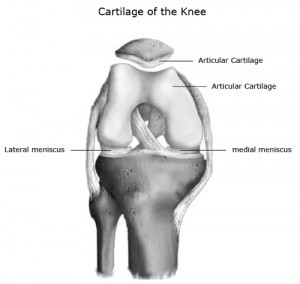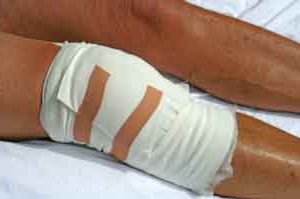What is Locked Knee?
A locked knee is a knee that cannot be bent or straightened — i.e. it is completely stuck in position and cannot be moved whether due to pain or a mechanical block. It may temporary (i.e. may resolve spontaneously or with the maneuvering of the leg) or permanent.
Understanding the anatomy of the knee may help you to better understand this article. See our related articles on knee joint function (physiology) and structure (anatomy).
What causes a knee to lock?
The most common causes of knee locking are as follows:
Knee Pain
You may perceive that your knee locks up because it becomes suddenly painful. In this situation, there is not a true mechanical block, per se, but your motion becomes limited secondary to severe pain i.e. your body doesn’t want to cause you more pain so it reflexively prevents motion.
While this is most common in the setting of painful arthritis, there are many causes of knee pain. These include:
- Knee trauma – e.g. fracture, dislocation, infection (arthritis, tendonitis, bursitis), or tendon tear, sprain or strain
- Knee arthritis – may cause swelling, pain
- Plica syndrome – Plica is the tissue the lines the inside of the knee. It can sometimes become injured or inflamed, which results in pain.
Loose Bodies
Loose bodies (or joint mice) are small or large fragments of cartilage or bone within the knee joint that can move or float into a position within the knee that causes it to become locked in a certain position.
Loose bodies may be formed as the result of trauma.
Torn Meniscus
A meniscus is a disc-shaped structure that acts as as a shock absorber in the knee joint. There are two in each knee joint, a medial (inner) and lateral (outer) meniscus. Menisci are susceptible to damage with certain sudden, twisting, falling, awkward landing movements.
 Tears of the meniscus can also cause the knee to lock. When the meniscus is torn, the torn portion can flap into the joint and block motion similar to how a loose body may also block motion.
Tears of the meniscus can also cause the knee to lock. When the meniscus is torn, the torn portion can flap into the joint and block motion similar to how a loose body may also block motion.
What to do when your knee locks:
If your knee locks suddenly and will not unlock, get help and call your physician or go to your nearest emergency department.
If it locks and your are able to get it to unlock, call your physician to discuss options for treatment or to schedule a visit.
The following information may additionally be helpful when thinking about treatment options for a locked knee.
The work-up of a locked knee
The work-up of a locked knee begins with your doctor asking you questions about any injury that may have started your symptoms and the quality of your symptoms themselves. Your doctor will perform an examination of your knee to give him/her clues regarding your injury.
Regular X-rays may be ordered to look at the bones of the knee to make sure there are no obvious loose bodies, fractures, and to assess the overall alignment of the knee. Depending on your symptoms, an MRI scan may be ordered to get a better look at the soft tissue structures (i.e. non-bony structures) of the knee. An MRI is very good at evaluating the soft tissue structures around the knee, including the menisci and ligaments.
Your doctor will determine whether your locking is due to a true mechanical lock or pain related (i.e. pseudo-locking — pain prevents movement).
Non-Surgical Treatment of a Locked Knee
The first step in treating a locked knee is to determine the cause of the locking. If the locking is intermittent or due to pain, non-surgical treatments can oftentimes be tried first.
If knee pain is the cause for a locked knee, the goal of treatment will be pain control and reducing inflammation. Rest, ice, compression, elevation (RICE) and anti-inflammatory medications are typically first-line therapies.
 Ice can be applied in an on-off fashion for 20 minutes increments to help with pain control and to reduce swelling (if present). If the knee is swollen, elevation can also help. Elevate the knee and leg on a pillow or cushion so that it rests above the level of the heart.
Ice can be applied in an on-off fashion for 20 minutes increments to help with pain control and to reduce swelling (if present). If the knee is swollen, elevation can also help. Elevate the knee and leg on a pillow or cushion so that it rests above the level of the heart.
Non-steroidal-anti-inflammatory drugs (NSAIDs) or other over-the-counter pain relievers such as Tylenol, Ibuprofen and Naproxen can also help to reduce both pain and inflammation. If these don’t work well for you, your doctor can also prescribe you stronger anti-inflammatory medications.
Cortisone is an anti-inflammatory medication that can be injected into a painful or swollen joint. This may additionally be an option for you.
In addition to the above, physical therapy may be beneficial. You will learn exercises, stretches and movements that will help to improve the function of your knee, which may help to minimize pain and inflammation in the knee.
Surgical Treatment of a Locked Knee
If your knee is permanently locked due to a mechanical block, or you have continued intermittent locking of the knee even after a trial of non-surgical treatments, arthroscopic surgery may be the next step in your treatment.
Knee arthroscopy is a minimally invasive procedure that is performed by inserting a camera and specialized tools into the knee. It allows your orthopedic surgeon to directly see within your knee joint. Ultimately, it can be used to address multiple issues within the knee.
How to help someone who’s knee has locked:
If someone you are with has a locked knee, help them to sit or lay down. If they are experiencing pain, consider providing them with an ice pack and something to elevate their leg on (if it is possible to elevate the locked knee). Consider getting them a pain medication (such as Tylenol, Aspirin, Ibuprofen or Naproxen) to take.
Then assist them to find medical help. Call their physician or consider driving them to the doctor’s office, urgent care, or emergency department.
Note that the information in this article is purely informative and should never be used in place of the advice of your treating physicians.
